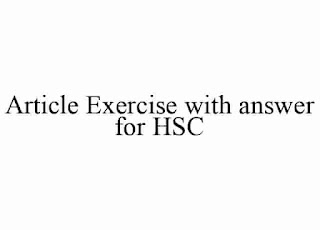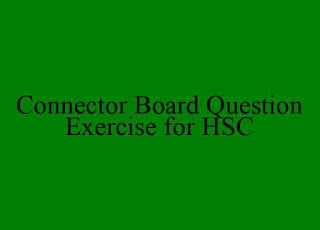Connectors exercise
1. A There is a wise saying that “A stitch in time saves nine.” (a) ---, the value of timely action is great (b) --- it saves much labour and time. (c) ---, it prevents loss. (d) --- if a work of today is put off for tomorrow, the load of work of tomorrow will be very heavy. (e) --- that will demand a hurried action. We know very well that hurry spoils the curry. (f) ---, a work done in a hurry is not well done and hurry does not lessen the volume of work. (g) ---, it increases the volume. (h) ---, delay sometimes complicates the action. (i) --- it becomes impossible to do the task fruitfully. (j) --- we should take timely and prompt actions to avoid any difficulty in doing our respective duties.
Answer: (a) That's/Actually/In fact/So; (b) because /as; (c) Besides/Moreover; (d) However /Truly speaking; (e) As a result /And /Then; (f) Unfortunately; (g) Rather /Instead; (h) Moreover/ Besides; (i) In that case/Often; (j) So/Therefore.
2. There are a good number of reasons why students in Bangladesh fail in English. (a) --- English is a foreign language. (b) --- students have no good feeling with English. (c) --- teaching a foreign language becomes very difficult when the learners are not mentally prepared to receive it. (d) ---- a teacher of English can hardly find out a technique suitable for all. (e) --- they fail to make the language learning interesting. (f) --- the motto of the questions in public examinations inspires memorizing rather than learning the language. (g) --- students can be successful in English if teachers are trained well. Students should be encouraged to learn four skills of language. The four skills of language are listening, speaking, reading and writing. Every teacher should put emphasis on the four skills of language. (h) --- they should give importance to communicative approach. (i) --- spontaneous communication of a language helps one learn it easily. (j) --- every student should be involved in communicative approach.
Answer: a) Firstly; (b) So/Naturally; (c) In this case/As a result; (d) Secondly; (e) As a result /Consequently/So; (f) Finally; (g) However; (h) Besides/Moreover/Also; (i) Because/It is because; (j) Therefore/Hence.
3. Health is one of the most important factors in human life. (a) —, a healthy man can earn money and wealth. (b) —, health is compared to wealth. It gives us (c) — bliss and happiness. (d) —, health alone can enable us to enjoy our life. (e) — it is not easy to maintain sound health. (f) —, we have to follow certain rules. (g) —, we have to take a balanced diet. (h) — we must take physical exercise regularly. (i) —, we can lead a decent life. (j) — good health is a must, many do not realize the value of health.
Answer: (a) Actually; (b) So/Thus; (c) both; (d) Even/Moreover/ Besides/In addition; (e) However / But; (f) For this; (g) At first/Firstly; (h) Secondly; (i) Thus; (j) Although/Though.
4. (a) — students have to face examinations regularly. (b) — it is very important to make good preparation for the examination. (c) — one has to make notes. (d) — he should make his lessons according to syllabus. (e) — he should learn and revise them on a daily basis according to a routine. (f) — for a good result, a student should start studying seriously from the very beginning of academic year. He must (g) — read the textbooks thoroughly (h) — keep revising them. (i) — it is also important to write a lot. (j) — students should test themselves before the examination by arranging model tests.
Answer: (a) Usually; (b) So; (c) For this; (d) Besides; (e) Again; (f) In addition; (g) not only; (h) but also; (i) Furthermore/Besides; (j) Finally.
5. Sports are a popular form of entertainment. (a) — many international sporting events are organized from time to time. (b) — these events are sponsored by multinational manufacturing companies and business firms. (c) —, they pay for the sports events in exchange for the right to advertise their products during those events. (d) — the sponsors' products receive maximum media coverage thus giving companies international recognition. This is only the commercial aspect of the international sport. (e) — there are other aspects, too. (f) — sports venue becomes a meeting place of the people from different countries. (g) — people of different nations get together on the occasion of an international sporting event, they come closer to each other. (h) —, they can share views, opinions and friendship. This opportunity creates a sense of brotherhood. (i) —, getting acquainted with different cultures helps to break down prejudice and broaden outlook. (j) — globalization has anything to do with the development of international relationship, sporting events can certainly contribute in a big way.
Answer: a) At present; (b) Most of; (c) However; (d) As a result; (e) But; (f) For example; (g) When; (h) Then/And; (i) Besides; (j) If.
6. Crows are ugly to look at. They are often looked down by other birds (a) — their ugliness. This often makes them sad and (b) — they want to be beautiful. (c) — how? One day, a crow got a chance to be beautiful. He found some beautiful feathers of a peacock in a jungle. He did not want to miss the chance. (d) — he took the feathers one by one (e) — stuck them in among his own feathers. He looked at himself and became glad (f) — he was no longer ugly like other crows. (g) — he made up his mind to go to the peacocks and live with them. Seeing him, the peacocks understood (h) — he was a crow in the guise of a peacock. They attacked him, pulled out the feathers and drove him away. (i) — he returned to the crows, they also drove him away. The crow realized his fault (j) — promised he would never be false and over-ambitious.
Answer: (a) for/because of; (b) so; (c) But; (d) So/Therefore; (e) and; (f) that; (g) Then; (h) that; (i) When; (j) and.
7. Good health refers to the physical and mental soundness. It makes one fit, active, (a) — keeps one free from diseases. (b) —, it is not easy to maintain good health. In order to keep good health, one should follow certain rules of health. (c) —, one should take regular physical exercise, proper rest or sleep and above all, a balanced diet. (d) — it is a matter of regret that most of our people live below the poverty line. (e) — they cannot manage all types of food necessary for maintaining good health. (f) —, there are some rich people who live in plenty. (g) —, they can't maintain good health. For they don't know the rules of health and (h) —, unable to choose the right food necessary for good health. Frustration, hopelessness, mental disorders, socio-economic confusions, etc. are part of our life. All these factors take away the peace of our mind and (i) —, affect our body. (j) —, a person with a simple and carefree life can enjoy a sound mind in a sound body.
Answer: a) and; (b) But; (c) For example/First /Firstly; (d) But/Unfortunately; (e) So/As a result/Consequently; (f) On the contrary; (g) Yet/Still; (h) therefore/hence/so; (i) also /consequently; (j) That’s why /So/On the other hand/However/ Thus.
8. Globalization is basically a process of expanding trade and commerce all over the world by creating a borderless market. (a) -++, it is creating more opportunities for capitalist countries rather than for the developing ones. (b) ---, in the name of help and cooperation, the capitalist countries are exploiting the cheap labour available in poor countries. (c) ---, the countries like ours is in fear of its adverse effects. (d) --- the fear is not quite justified. (e) --- globalization has also a far-reaching effect on many aspects of life. (f) ---, with the development of hi-tech communication media and rapid transportation facilities, the world has come closer. (g) ---, we can share our joys and sorrows like next door neighbours. (h) --- globalization brings all types of different customs and behaviour into homes through satellite television channels and the internet. (i) ---, we can enrich our local culture through constant interaction with different cultures. (j) ---, it is commonly found that our local culture is being badly manipulated by the Western culture.
Answer: (a) In fact/Unfortunately; (b) Actually/ Truly speaking/For example; (c) For this reason/Consequently; (d) However; (e) Anyway /Nevertheless; (f) For instance/To illustrate; (g) Now; (h) Furthermore/Besides/ Moreover; (i) Thus/So; (j) However/Yet /Unfortunately.
9. Multiple choice questions are set to assess learning outcomes effectively and efficiently. Students are given a set of possible answers to choose from and the options are intricately put. (a) --- students mistakenly think these questions are easy. (b) ---, they think it is merely a waste of time to study multiple choice questions. (c) ---, multiple choice questions can be challenging for various reasons. (d) ---, the questions can be wide ranging. (e) ---, it is not in any particular order. (f) ---, they often have negative statements and 'distracters' which can be confusing. (g) ---, the questions are designed to test on various types of subject matters and concepts. (h) ---, it is not about merely testing knowledge of basic ideas. (i) ---, you really need to understand the subject matters to do well in multiple choice questions. (j) ---, if students are instructed in proper ways, they can perform better on the tests.
Answer: (a) Often; (b) So/Therefore; (c) However/Actually; (d) For example/First; (e) Again/Secondly; (f) Besides; (g) In fact/ Actually; (h) Thus/That is/In other words; (i) Hence /Therefore/So; (j) Anyway/However.
10. These two girls, (a) —, are from a village (b) — they look malnourished. Their parents, landless (c) — jobless, had to migrate to the city just to make a living. (d) —, they have found shelter in a slum. The members of their family are (e) — rickshaw-pullers (f) — day labourers or do some small business. Female members work as (g) — part-timer or full time housemaid. These girls do not go to school or (h) — they do, they go to an underprivileged school. They have to earn something to supplement the family income before (i) — after school. They do not know (j) — they will do in future.
Answer: a) indeed/actually; (b) and; (c) and; (d) Somehow/However; (e) either; (f) or; (g) either; (h) if; (i) or/and; (j) what.



